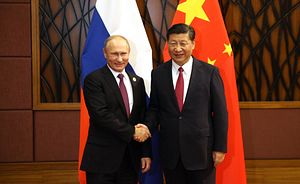The Diplomat author Mercy Kuo regularly engages subject-matter experts, policy practitioners, and strategic thinkers across the globe for their diverse insights into U.S. Asia policy. This conversation with Karen-Anna Eggen, a Ph.D. fellow at the Norwegian Institute of Defence Studies, is the 303rd in “The Trans-Pacific View Insight Series.”
Explain the strategic context of Russia’s protestations over Ukraine’s interest in joining NATO.
Ukraine holds a special place in Russian thinking. Since 2014, and increasingly so in 2021, the Russian elite has used historic and cultural reasoning to argue that Ukraine belongs to Russia’s sphere of influence. Indeed, both President Vladimir Putin and former President Dmitry Medvedev have published texts this year arguing that Ukraine belongs to Russia. It is hard to escape the symbolism of such statements being made in the lead-up to the 30th anniversary of the fall of the Soviet Union.
Ukraine, and similarly Belarus, are crucial buffer zones between Russia’s border and NATO. This is a central Russian security concern and reflects Russia’s zero-sum mindset. Russia has no interests in NATO forces or U.S. military equipment close to its border, especially not in Ukraine. Russia is also set on protecting its military bases on Ukrainian (now occupied) territory and secure open access to the Black Sea. The Russian elite is convinced that Ukraine’s Western pivot poses a real threat.
What is Moscow’s strategic calculus in raising the stakes of a possible military invasion into Ukraine?
The scary thing is that no one really knows what Moscow’s strategic calculus is. Most agree they probably will not instigate a large-scale invasion. But they have all the necessary equipment on the border to do so and Russia has shown the resolve and capability to do so before.
As for now, the force build-up seems to be a way to force Ukraine and the United States’ hand. Russia is an expert in creating crises situations which can only be solved with Russia’s help or on Russia’s terms. After eight years of frozen war, all other means – economic, information, cyberattacks, subversion, proxy war, and so on – are exhausted in the effort to turn Kyiv back towards Russia, to no avail. So, Moscow turns to its most reliable ally, its military, to see if it can move things forward and secure strategic gains.
Are there any parallels between Moscow’s quest to keep Ukraine in Russia’s orbit and Beijing’s similar efforts toward Taiwan?
Both Ukraine and Taiwan are small powers grappling with a persistent, and recently growing, threat posed by greater powers, in this case Russia and China, who both believe these states are rightful parts of their territory, or at least sphere of influence in the case Ukraine. This takes place in a context of heightened global tensions and great power rivalry. The U.S. is a part of both conflicts, although it has not extended the same security guarantees to Ukraine as to Taiwan.
Both Ukraine and Taiwan have strained relationships with their dominators, and importantly, both have strategically oriented themselves towards the West to much irritation in Moscow and Beijing. Neither is, however, a member of NATO and both are currently facing considerable aggression without waterproof security guarantees, despite U.S. reassurances. The stakes are high, in both regions, and developments in the coming years will have major impacts on international relations.
What signal would U.S.- European collective resolve and coordination in managing Russia send to China?
The Western alliance needs to show it is still a force to be reckoned with and that liberal democracy is still on the table as a political option for states. A failure to show resolve in Ukraine would look like a loss and would nurture Chinese and Russian attempts to undermine U.S. credibility as a protector and ally.
At the same, we have seen that forceful responses drive Russia closer to China. This was the case after the various rounds of sanctions imposed on Russia after 2014 and Russia is probably banking on Chinese economic support this time too, both as a safety net and as a tool to force U.S. concessions.
Russia and China’s alignment builds on shared values and interests, and the West should prepare for a joint Russia-China front, be that in the information sphere or in the military realm. They can easily exploit increased tensions in each other’s regions to enhance their own positions. Should war break out between Russia and Ukraine, and keep the U.S. and Europe preoccupied, China could seize the opportunity, militarily or by other means, to enhance its position vis-à-vis Taiwan, and vice versa.
Assess Norway’s strategic position in NATO’s efforts to de-escalate Russia-Ukraine tensions.
As a relatively small state bordering Russia, Norway is interested in maintaining rule of law and the current international order. In this regard, it is in Norway’s interest to support NATO and EU initiatives vis-à-vis Russia. But Norway also has a longstanding tradition of successful bilateral cooperation with Russia and maintains dialogue where possible. This is essential in a time of heightened tensions and especially when perceptions of reality continue to diverge. A key problem in this escalating situation is that neither side can offer many, if any, concessions – not Ukraine, not NATO, not Russia. In this case, Norway has little room for maneuver and influence as far as deescalating Russia-Ukraine tensions.
Still, Norway’s strategic position vis-à-vis the Russian Northern Fleet and the strategically important nuclear arsenals in the High North means heightened awareness of Russia’s military behavior towards Ukraine and in the Black Sea, especially considering that a Russian invasion might lead to increased Russian and NATO military activity in the High North. This would significantly alter threat perceptions on both sides and put considerable strain on bilateral relations.
































